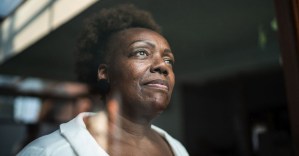By Nia Smith,
Special to the AFRO

This year, October 2 – 6 was recognized as Mental Illness Awareness Week. Originally established in 1990, Mental Illness Awareness Week was created to educate Americans on the topic of mental illness.
On a college campus, mental illness is more prominent than one may expect. According to the American Psychological Association, a scientific and professional organization composed of over 146,000 members, during the 2020–2021 school year, “more than 60 percent of college students met the criteria for at least one mental health problem,” according to the Healthy Minds Study, which collects data from 373 campuses nationwide.

(Courtesy photo)
In another national survey by the American College Health Association, almost three quarters of students reported “moderate or severe psychological distress.” Though these studies were taken during the years of the COVID-19 pandemic, these numbers remain true. It is more likely for students of color to not ask for help when faced with these issues, in comparison to their White counterparts, according to Suicide Prevention Resource Center. So how does one on a college campus tackle this issue?
The University of Maryland Counseling Services, located in the Shoemaker Building on the South Campus, houses many of the different mental wellness resources available to students. Here at the University of Maryland (UMD), the school promotes mental health awareness week by sponsoring activities and events open to all students. In a time when the seasons are changing and coursework begins to pick up, the University remains committed to putting their students’ health first by hosting these activities.
From depression screenings to mental health fairs, UMD has a plethora of resources for students to utilize to keep their mental health intact throughout their college years.
Merieum Easterling, a UMD sophomore majoring in information science with a French studies minor, says she has personally benefited from the resources offered on campus.
“I know where the counseling services are and the resources available from the behavioral health center,” she said. “One in particular that I used was their ADHD testing.”

Easterling says she has learned to practice self care by putting herself first.
“Knowing when I need to take a step back for myself is very important,” she said, adding that these days she knows how to “look for early warning signs before it gets to a point where [she] can’t handle it.”
Easterling said she has learned a few tricks when it comes to managing her own self-care.
“Some of my personal ‘go-to tips’ are listening to music and going home when [the] opportunity is available. I also recommend taking a step back and doing things that help boost her overall mood, such as talking and hanging out with friends.”
Being a part of the Big Ten Conference, UMD is the home to many student athletes. With the pressure of course work and traveling across the country to compete against top schools, these athletes must keep up with their physical and mental health.
Student athlete James Gladden is a kinesiology major and sophomore pitcher for the Maryland baseball team.
When asked about what he does to deal with his mental health, especially through an athlete’s lens, he says, “Honestly I’ve just done things that I enjoy to distract myself like baseball, or being with people I enjoy being around.”

Gladden admits that while he knows it is not the healthiest behavior, as an athlete, when it comes to tough challenges, he’s “always been taught to put [his] head down suck it up, and learn from it.”
Still, more and more institutions of higher learning are revamping and funding initiatives to help students with their mental health.
Ashley Ankapong, a senior journalism major and resident assistant said she is aware that the university has a counseling center on campus.
Ankapong told the AFRO that as a college student, she has learned some tips to help with her mental health.
“I use prayer and my journal, but I also have this paper that the school therapist gave me last year about negative thinking patterns,” she said. “I’ve used that to remind myself to change my thinking patterns every now and then.“
Nia Smith is an AFRO Intern from the University of Maryland.
The post AFRO inside look: University of Maryland students weigh in on balancing school, work and life challenges appeared first on AFRO American Newspapers .











